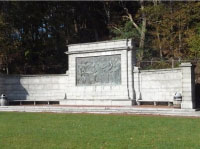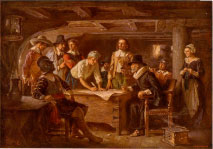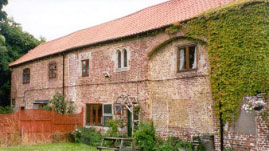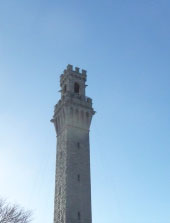by Paul Jehle
Mayflower Compact Day is hardly heard of these days. It used to be on the calendar a hundred and fifty years ago – at least in people’s minds. Now, it is not taught or remembered in most schools in America, where we have benefited from it as a legacy of self-government All it takes, however, is for a few who remember to be a remnant that keeps alive it’s significance.
So what is Mayflower Compact Day? It is the day we remember when the Mayflower Compact was signed on board the Mayflower, while it lay anchored in what is now Provincetown Harbor, November 11, 1620. With the change in the calendar in 1752, the date now corresponds to November 21, and thus on this day, this year, we commemorate the 391st anniversary of the signing of this historic document. Forty-one males signed the document that brought unity in the midst of talk of mutiny.
A compact is a covenant, and thus to fully understand the significance of this document, we need to briefly review the Pilgrim view of forming covenants. Since the Pilgrims were children of the Reformation, their view of covenant came from the Bible. It was God that initiated the concept of covenant, first with Adam and Eve (Genesis 2:15-17 and 2:24). God also made a covenant with Noah in Genesis 9 and, of course, the process of “cutting” covenant was depicted in visual form for Abraham in Genesis 15. Throughout the Bible covenants were used both vertically (with God directly) and horizontally (with humans) to depict God’s process of bringing people into unity with Him and one another. Unity of purpose and harmony with God set the highest ideals for good behavior.
Minimally, a covenant must have sanctity, sanction, and justice. Sanctity means it has a divine origin. Sanction means there are penalties for disobeying it, and justice means that God’s righteousness and Kingdom are advanced when obeying the agreement set with God and man. The Pilgrims, while they were meeting secretly at Scrooby Manor in England (1606), made their now famous church covenant, described by Bradford in this way:
They shook off this yoke of antichristian bondage, and as the Lord’s free people joined themselves (by a covenant of the Lord) into a church estate, in the fellowship of the gospel, to walk in all His ways made known, or to be made known unto them, according to their best endeavors, whatsoever it should cost them.
This church covenant brought out the best in that small band of believers. It declared their highest ideals and thus drew believers into unity. The phrase “whatsoever it should cost them” made it clear that only those with clear vision would probably agree. In addition, the people ratified this covenant, not just the leaders, and thus Christian self-government was the cornerstone of covenant.
William Bradford made it clear that what made their Pastor John Robinson unique was the fact that
Besides his singular abilities in divine things (wherein he excelled) he was also very able to give directions in civil affairs…by which means he was very helpful to their outward estate…
In other words, their Pastor led them, not just in the internal spiritual affairs of their soul, but also in how to extend what they knew within the church to society at large, especially in civil affairs.
No wonder when Pastor Robinson sent his farewell letter to the Pilgrims upon their departure in 1620, knowing that they would need to form their own civil government, he gave this sound advice:
Whereas you are become a body politic, using amongst yourselves civil government, and are not furnished with any persons of special eminency above the rest, to be chosen by you into office of government; let your wisdom and godliness appear, not only in choosing such persons as do entirely love and will promote the common good… not being like the foolish multitude who more honor the gay coat than either the virtuous mind of the man, or glorious ordinance of the Lord.
This is good advice, and if more Pastors today gave such advice to their flock, believers might vote more righteously, remaining active in civil affairs and recognize that civil government is the glorious ordinance of the Lord. When realizing that they had been blown off course and were not within the boundaries of their Charter (whose northern border was where Manhattan is today), Bradford explains:
Occasioned partly by the discontented and mutinous speeches that some of the strangers amongst them had let fall from them in the ship: that when they came ashore they would use their own liberty, for none had power to command them,”
they thus drew up the Mayflower Compact. They exercised self-government, writing a covenant for their civil affairs as they had already done for their religious affairs.
There, off the coast of what is now Provincetown, the cornerstone of American government was born. Not only that, their pastor John Robinson’s teachings inspired this civil document! It is for this and many other reasons that Robinson should be known as the shepherd of America. The ideas contained within the Mayflower Compact are significant and foreshadow the Declaration that was to come years later.
- “In the Name of God, Amen. We whose names are underwritten, the loyal subjects of our dread Sovereign Lord King James…” God first, then the people, and then the King—a new power flow! In England, it had become God, the King and then the people. Our rights are God-given, that is, unalienable!
- “Having undertaken, for the Glory of God and advancement of the Christian faith and Honor of our King and Country…” The cornerstone of civil government’s mission is to advance the Christian faith and honor the role of the civil magistrate according to God’s Word.
- “Solemnly and mutually in the presence of God and one of another, Covenant and Combine ourselves together into a Civil Body Politic.” Civil government operates by covenant, which is why we have the rule of law rather than the rule of men!
- “To enact, constitute and frame such just and equal Laws…” Through our representatives, we govern ourselves, enacting laws that are just and protect the equal rights of citizens. Since God gave us the power to do so—when laws are unjust—we ultimately have ourselves to blame.
Though the Pierce Patent of 1621, the original of which hangs in Pilgrim Hall today, made the Pilgrims legal in the eyes of England, the Pilgrim laws that were subsequently published copied the Mayflower Compact as its preamble, indicating that they functioned under this Covenant! Shouldn’t we honor such a beginning? Shouldn’t we celebrate such a day when self-government was born off the coast of New England? As Bradford would say, “Let the glorious name of Jehovah have all the praise!”
From Plymouth Rock Foundation’s E-News – November, 2011
Dr. Paul Jehle, Executive Director
Used by Permission
© 2011






No comments yet.